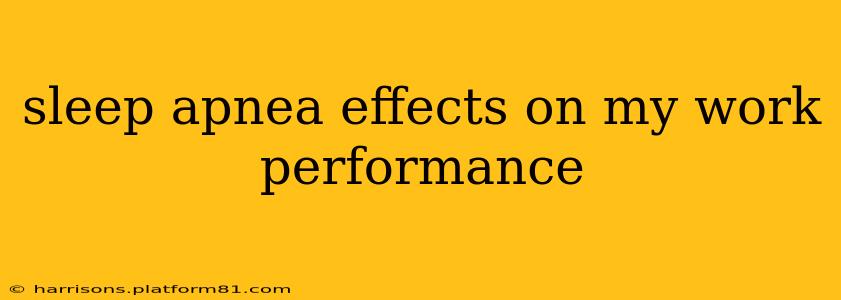Sleep apnea, a sleep disorder characterized by pauses in breathing during sleep, significantly impacts daily life, and its effects on work performance are substantial and often underestimated. This comprehensive guide explores the various ways sleep apnea can negatively influence your professional life, offering insights into how to manage its effects and improve productivity.
How Does Sleep Apnea Affect Work Performance?
The consequences of untreated sleep apnea extend far beyond feeling tired. The repeated disruptions to sleep lead to daytime sleepiness, impacting concentration, cognitive function, and overall productivity. This can manifest in several ways:
-
Reduced Cognitive Function: Sleep apnea severely impacts cognitive abilities, including memory, attention span, and problem-solving skills. This makes it difficult to focus on tasks, remember important details, and make sound decisions at work.
-
Increased Errors and Accidents: The constant state of drowsiness increases the risk of making mistakes, whether it's in data entry, project management, or even operating machinery. This can lead to costly errors and, in some cases, workplace accidents.
-
Decreased Productivity and Efficiency: The struggle to stay alert and focused translates to reduced productivity. Tasks take longer to complete, and overall work output suffers. This can lead to missed deadlines and increased stress.
-
Absenteeism and Presenteeism: Sleep apnea can lead to increased absenteeism due to fatigue and illness. It can also result in presenteeism, where employees are physically present but unproductive due to sleepiness and lack of concentration.
-
Irritability and Mood Swings: Sleep deprivation caused by sleep apnea can lead to irritability, mood swings, and difficulty managing stress. This can negatively affect interactions with colleagues and clients, damaging relationships and hindering teamwork.
-
Increased Risk of Burnout: The constant struggle to maintain focus and productivity while battling sleepiness creates significant stress, increasing the risk of burnout and potential health problems.
What are the common symptoms of sleep apnea that affect work?
This section addresses questions frequently asked about the workplace symptoms of sleep apnea.
How can I tell if my sleep apnea is affecting my work?
Several indicators suggest your sleep apnea is negatively impacting your work performance. Do you frequently experience excessive daytime sleepiness, struggle to concentrate, make more mistakes than usual, or find yourself less productive? If so, it’s crucial to consult a healthcare professional to evaluate your sleep patterns and rule out any underlying conditions.
Can sleep apnea cause memory problems at work?
Yes, sleep apnea can significantly impair memory and cognitive functions. The fragmented sleep experienced with sleep apnea prevents the brain from consolidating memories properly, leading to difficulties with recalling information and struggling to retain new information. This is particularly problematic in jobs requiring sharp memory and recall.
Does sleep apnea affect my judgment and decision-making at work?
Indeed, the cognitive impairment caused by sleep apnea can affect judgment and decision-making. The brain's executive functions, responsible for planning, organizing, and making sound decisions, are compromised during sleep deprivation. This can result in poor choices, leading to mistakes and setbacks.
How does sleep apnea affect my concentration and focus at work?
Sleep apnea directly impacts concentration and focus. The constant sleepiness and brain fog associated with the condition make it challenging to pay attention to details, follow instructions, or complete tasks effectively. This lack of focus can have serious consequences, especially in work environments requiring precision and alertness.
Managing Sleep Apnea's Impact on Work
Addressing sleep apnea requires a multi-faceted approach:
-
Medical Diagnosis and Treatment: Seek professional medical help for a proper diagnosis and treatment plan. Common treatments include CPAP (Continuous Positive Airway Pressure) therapy, oral appliances, and in some cases, surgery.
-
Lifestyle Changes: Improving sleep hygiene, losing weight if necessary, and avoiding alcohol and sedatives before bed can significantly alleviate symptoms.
-
Open Communication: Talk to your supervisor or HR department about your condition and explore options for adjustments to your work schedule or workload.
-
Prioritizing Sleep: Make sleep a priority, aiming for 7-8 hours of quality sleep each night.
By understanding the impact of sleep apnea on work performance and taking proactive steps to manage the condition, you can significantly improve your productivity, job satisfaction, and overall well-being. Don't hesitate to seek professional help—it's an investment in your health and career.
